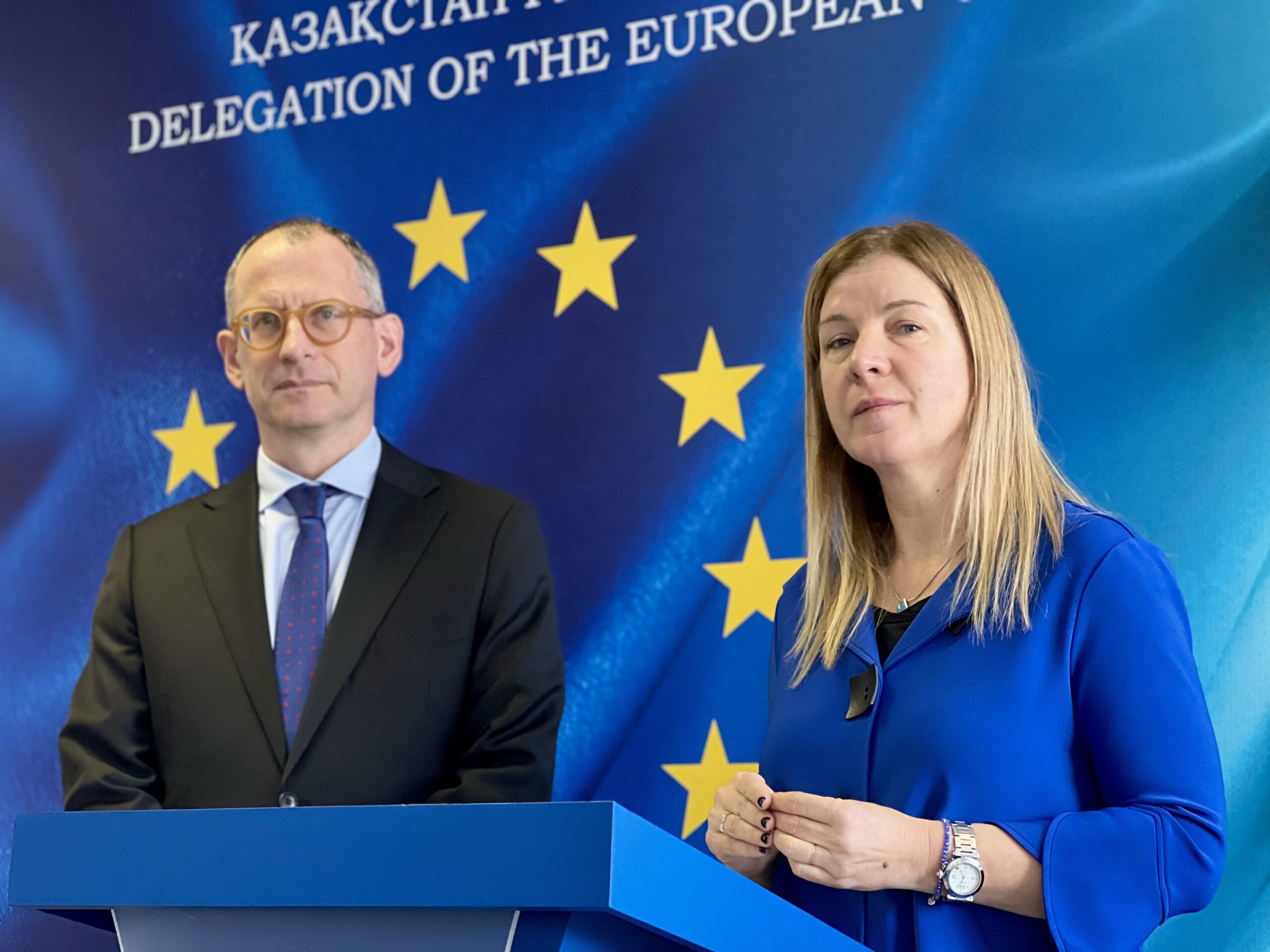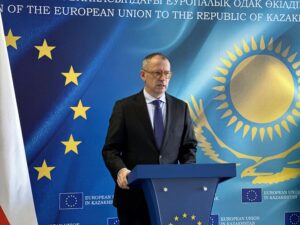ASTANA—The European Union (EU) Delegation to Kazakhstan hosted a press conference on Jan. 27 in Astana to outline the priorities of the Polish presidency of the EU Council and its implications for Kazakhstan and Central Asia. The event featured EU Ambassador to Kazakhstan Aleška Simkić, and the Chargé d’Affaires of the Embassy of Poland in Kazakhstan, Michał Labenda.

From left to right: the Chargé d’Affaires of the Embassy of Poland in Kazakhstan, Michał Labenda and the EU Ambassador to Kazakhstan, Aleška Simkić. Photo credit: Nagima Abuova / The Astana Times
Poland assumed the presidency of the EU Council on Jan. 1 and will hold the position through June 30. Thirteen years after its first presidency and two decades after joining the EU, Poland has unveiled a program focused on strengthening security.
Over the next five months, Poland will host more than 300 official meetings, including 22 informal councils of EU ministers. This presidency coincides with the start of the EU’s institutional cycle, providing an opportunity to set long-term goals, propose solutions, and initiate processes for the next five years. The presidency’s agenda emphasizes strengthening European security across seven dimensions: external, internal, information, economic, energy, food and health.
Poland’s priorities: “Security, Europe!”

The Chargé d’Affaires of the Embassy of Poland in Kazakhstan, Michał Labenda outlines Poland’s central goals during EU presidency. Photo credit: Nargiza Raimbekova / The Astana Times
“The Polish presidency has begun amid a highly complex international environment. Just to mention the ongoing war in Ukraine, growing geopolitical tensions, including in the Middle East, mounting hybrid threats and disinformation campaigns. It is no wonder our presidency’s motto is ‘Security, Europe!’” said Labenda.
He outlined Poland’s central goals, including bolstering security in Ukraine and Moldova, strengthening EU-NATO cooperation, and addressing disinformation. The agenda also includes fostering relationships with Türkiye, Africa and Latin America, hosting expert forums such as a flagship conference on the Indo-Pacific, and tackling global challenges such as migration, energy policy and defense.
“In most general terms, our presidency’s foreign policy agenda focuses on three areas: maximizing support for Ukraine, maintaining current policies toward Russia and Belarus, and strengthening the security and resilience of the EU and its partners,” Labenda added.
Implications for Kazakhstan and Central Asia
The Polish presidency will focus on enhancing economic cooperation with partner countries and expanding ties with Central Asian nations, including Kazakhstan, Uzbekistan, Turkmenistan, the Kyrgyz Republic, Tajikistan and Azerbaijan. It will also commemorate the 40th anniversary of the Schengen Agreement, one of the EU’s key achievements. This milestone offers an opportunity to prioritize the functioning and management of the Schengen Area. The presidency will also address the issue of introducing temporary border controls within Schengen countries’ internal borders.
“Here in Kazakhstan, the EU delegation works closely with the presidency to advance shared priorities. Our goal remains to represent the EU effectively while ensuring strong collaboration with our Polish colleagues,” said Simkić.
Simkić emphasized three key areas for EU engagement in Kazakhstan: trade, transport and energy, and fostering people-to-people connections. She highlighted the EU’s Global Gateway initiative, which aims to finance transport and renewable energy infrastructure projects worldwide, including Kazakhstan.
“The EU and its member states want to remain Kazakhstan’s largest trade partner and foreign investor, and we will continue to work toward that,” she said.
Regarding energy and transport, Simkić pointed to European banks and companies exploring opportunities to improve connectivity between Asia and Europe, focusing on renewable energy sources such as wind and solar power.
“We also hope to continue funding opportunities for Kazakh students to study in Europe while also encouraging more European students to study in Kazakhstan,” Simkić said, emphasizing the importance of educational exchanges and civil society initiatives.
Visa facilitation was another significant topic. Simkić noted that easing visa requirements between Kazakhstan and the EU requires consensus among all Schengen member states. While Kazakhstan is viewed positively and not as a migration risk, broader geopolitical and migration challenges have slowed the process.
“Kazakhstan is high on the European Commission’s agenda. We hope to start the process soon. I am advocating for it to happen quickly because I would like to see a visa facilitation agreement finalized during my tenure. I know this is of great interest to the people of Kazakhstan, and we are constantly communicating this to Brussels,” she said.
